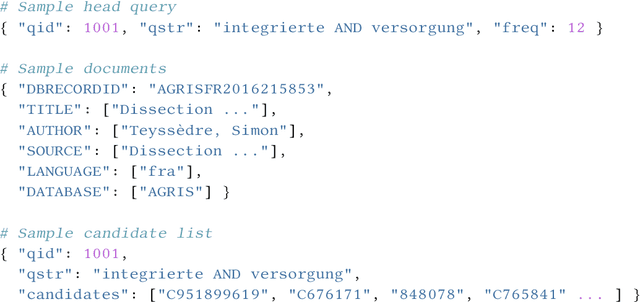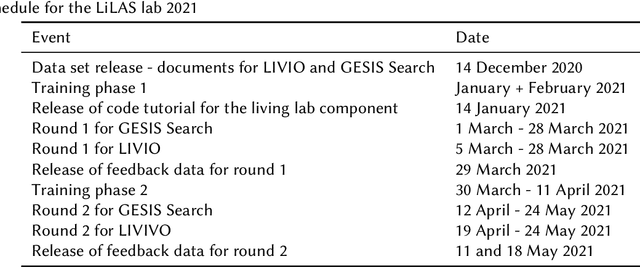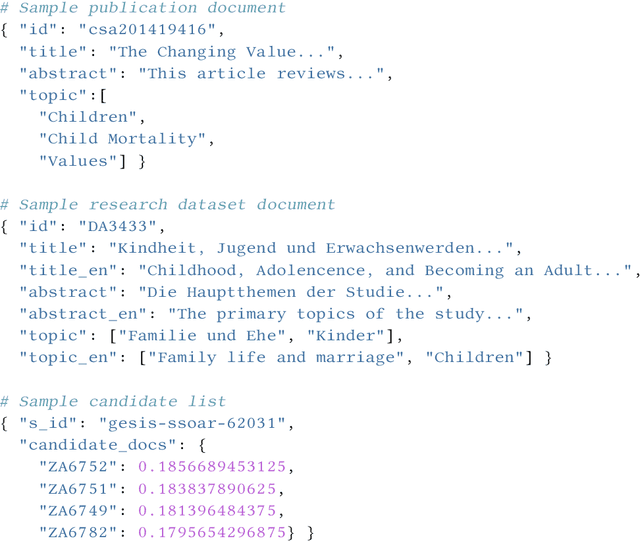Leyla Jael Castro
ZB MED Information Centre for Life Sciences, Cologne, Germany
Research Knowledge Graphs: the Shifting Paradigm of Scholarly Information Representation
Jun 08, 2025Abstract:Sharing and reusing research artifacts, such as datasets, publications, or methods is a fundamental part of scientific activity, where heterogeneity of resources and metadata and the common practice of capturing information in unstructured publications pose crucial challenges. Reproducibility of research and finding state-of-the-art methods or data have become increasingly challenging. In this context, the concept of Research Knowledge Graphs (RKGs) has emerged, aiming at providing an easy to use and machine-actionable representation of research artifacts and their relations. That is facilitated through the use of established principles for data representation, the consistent adoption of globally unique persistent identifiers and the reuse and linking of vocabularies and data. This paper provides the first conceptualisation of the RKG vision, a categorisation of in-use RKGs together with a description of RKG building blocks and principles. We also survey real-world RKG implementations differing with respect to scale, schema, data, used vocabulary, and reliability of the contained data. We also characterise different RKG construction methodologies and provide a forward-looking perspective on the diverse applications, opportunities, and challenges associated with the RKG vision.
Open and Sustainable AI: challenges, opportunities and the road ahead in the life sciences
May 22, 2025Abstract:Artificial intelligence (AI) has recently seen transformative breakthroughs in the life sciences, expanding possibilities for researchers to interpret biological information at an unprecedented capacity, with novel applications and advances being made almost daily. In order to maximise return on the growing investments in AI-based life science research and accelerate this progress, it has become urgent to address the exacerbation of long-standing research challenges arising from the rapid adoption of AI methods. We review the increased erosion of trust in AI research outputs, driven by the issues of poor reusability and reproducibility, and highlight their consequent impact on environmental sustainability. Furthermore, we discuss the fragmented components of the AI ecosystem and lack of guiding pathways to best support Open and Sustainable AI (OSAI) model development. In response, this perspective introduces a practical set of OSAI recommendations directly mapped to over 300 components of the AI ecosystem. Our work connects researchers with relevant AI resources, facilitating the implementation of sustainable, reusable and transparent AI. Built upon life science community consensus and aligned to existing efforts, the outputs of this perspective are designed to aid the future development of policy and structured pathways for guiding AI implementation.
Living Lab Evaluation for Life and Social Sciences Search Platforms -- LiLAS at CLEF 2021
Oct 05, 2023Abstract:Meta-evaluation studies of system performances in controlled offline evaluation campaigns, like TREC and CLEF, show a need for innovation in evaluating IR-systems. The field of academic search is no exception to this. This might be related to the fact that relevance in academic search is multilayered and therefore the aspect of user-centric evaluation is becoming more and more important. The Living Labs for Academic Search (LiLAS) lab aims to strengthen the concept of user-centric living labs for the domain of academic search by allowing participants to evaluate their retrieval approaches in two real-world academic search systems from the life sciences and the social sciences. To this end, we provide participants with metadata on the systems' content as well as candidate lists with the task to rank the most relevant candidate to the top. Using the STELLA-infrastructure, we allow participants to easily integrate their approaches into the real-world systems and provide the possibility to compare different approaches at the same time.
Online Information Retrieval Evaluation using the STELLA Framework
Oct 24, 2022
Abstract:Involving users in early phases of software development has become a common strategy as it enables developers to consider user needs from the beginning. Once a system is in production, new opportunities to observe, evaluate and learn from users emerge as more information becomes available. Gathering information from users to continuously evaluate their behavior is a common practice for commercial software, while the Cranfield paradigm remains the preferred option for Information Retrieval (IR) and recommendation systems in the academic world. Here we introduce the Infrastructures for Living Labs STELLA project which aims to create an evaluation infrastructure allowing experimental systems to run along production web-based academic search systems with real users. STELLA combines user interactions and log files analyses to enable large-scale A/B experiments for academic search.
* arXiv admin note: text overlap with arXiv:2203.05430
Overview of LiLAS 2021 -- Living Labs for Academic Search
Mar 10, 2022



Abstract:The Living Labs for Academic Search (LiLAS) lab aims to strengthen the concept of user-centric living labs for academic search. The methodological gap between real-world and lab-based evaluation should be bridged by allowing lab participants to evaluate their retrieval approaches in two real-world academic search systems from life sciences and social sciences. This overview paper outlines the two academic search systems LIVIVO and GESIS Search, and their corresponding tasks within LiLAS, which are ad-hoc retrieval and dataset recommendation. The lab is based on a new evaluation infrastructure named STELLA that allows participants to submit results corresponding to their experimental systems in the form of pre-computed runs and Docker containers that can be integrated into production systems and generate experimental results in real-time. Both submission types are interleaved with the results provided by the productive systems allowing for a seamless presentation and evaluation. The evaluation of results and a meta-analysis of the different tasks and submission types complement this overview.
 Add to Chrome
Add to Chrome Add to Firefox
Add to Firefox Add to Edge
Add to Edge